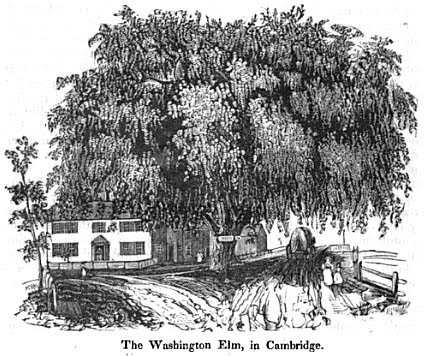
THE WASHINGTON ELM.
HOW we all look forward every year to the Fourth of July!
At last the morning comes, and we are awakened at daylight by the booming of cannon, and spring from our beds to commence the "celebration." And for weeks after it has passed, we talk in the daytime and dream through the night of the music, the processions, the speeches, and the fireworks. Perhaps, too,
some of us carry the marks of the day on our faces or hands, by reason of being too careless with the powder. But for all that, we each vote the day a
jolly one, and wish it came oftener than once a year.
But how many of us think, as we light our firecrackers and sling our torpedoes, of the reason of all this noise and jubilee? Do we stop to think of our great grandfathers risking their lives, their families, and their happy homes that they might make us, their great grand-children, a free Nation.
And do we realize that the "celebration" is to make us remember how much we owe to their bravery?
If so, perhaps some of us would spend more of the day in reading of their noble deeds, and would resolve that we, too, would try to be as noble hearted and brave as they.
What! Children be noble and brave? Do you ask? Certainly!
When you stand up for that poor boy with ragged clothes, whom the others are laughing at and pelting with sticks and stones; when you do every thing you can to help and amuse your sister, instead of plaguing her until she cries and calls you a "horrid boy"; when you both let a little of your play wait until you have helped papa or mamma; when you do these and a score of other little things, you are being as noble hearted as any soldier who ever faced the cannon's mouth.
But you will wonder what all this has to do with "Washington's Elm."
Well, you know that George Washington was the General, commanding all the American forces during the war of the Revolution. The place where he first took command of the army was in Cambridge, Mass., under the very old elm seen in the picture. On the granite slab under the tree are these words:—
Under this Tree,
WASHINGTON First took command
of the AMERICAN ARMY.
July 3, 1775.
Bunker hill monument, and the old battlegrounds at Lexington and Concord are familiar to every school boy, but Washington's Elm is not so wellknown. How many of the children will read about it in the history, and resolve to be noble and brave in your youth, that you may be the same when you get to be men and women
"As the twig is bent so the tree inclines."

Today